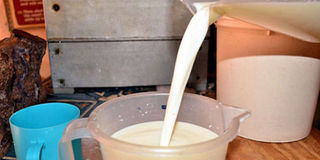Drought pushes dairy processors to milk Kenyans dry

Cow milk. Prices of raw milk have reduced. PHOTO | FILE | NATION MEDIA GROUP
What you need to know:
- Mr Wamae said that there is little fresh milk in the market, and that processors may be forced to import the commodity.
- The ongoing drought has destroyed pasture. A bale of hay now costs over Sh200, up from between Sh140 and Sh160.
Processors have reduced the prices of raw milk despite a high demand for the commodity, which is in short supply because of the prolonged drought, leaving farmers angry and analysts puzzled.
Some have even increased the price of processed milk as farmers continue to suffer.
Early this week, the New Kenya Cooperative Creameries, the only processor owned by the public, announced that it had increased the consumer price of their half-litre long-life milk by Sh5 to Sh55.
New KCC buys a litre of milk from farmers at Sh33 and sells half a litre of fresh milk at Sh50.
Brookside, the largest milk processor in the country, sells a half-litre packet of their brand at between Sh50 and Sh55.
DROUGHT
Mr John Gethi, the Director of Procurement and Manufacturing at Brookside, said the drought has had an effect on market dynamics resulting in increased consumer prices.
“Dry weather over major production areas has seen our milk supply drop. We are training farmers on feed preparation and conservation as a means of addressing the challenge of cattle feeds and the need for consistent milk production,” he said.
Githunguri Dairy, which was earlier in the year buying milk from farmers at Sh40 per litre, has now cut the price to Sh36.
However, the consumer price of its Fresha brand remains Sh50 per half-litre of long-life milk. A similar amount of fresh milk packaged by the dairy retails at Sh48.
“We are working on ways of increasing producer prices, but we first have to adjust consumer prices to stay in the market,” New KCC chairman Matu Wamae told Saturday Nation on Friday without saying when the new producer prices would be announced.
HIGH COST
Mr Wamae said that there is little fresh milk in the market, and that processors may be forced to import the commodity.
For now, New KCC is using powder milk to make the long-life variety. “This is the milk we accumulated during the rainy season. We keep it for two to three years,” he said.
He spoke even as farmers decried the low prices, accusing processors of exploiting them.
The farmers said they can no longer afford the high cost of animal feeds as the dry spell bites.
Some farmers said they were earning as low as Sh26 per litre of milk. Cooperative societies deduct about Sh4 per litre as administrative transport costs.
PASTURE
In February, processors cut the price of raw milk by Sh3 per litre but retail prices remained unchanged.
“We are very angry at big players who are dictating prices,” said Ms Wairimu Githae, a Kinangop-based dairy farmer.
She said their cooperative society pays them Sh28 per litre. It sells to New KCC and another private processor based in Limuru.
Aside from the high cost of commercial feeds, the ongoing drought has destroyed pasture. A bale of hay now costs over Sh200, up from between Sh140 and Sh160.
She said that small-scale traders pay farmers better, as high as Sh50 per litre.
INEFFICIENCY
The farmers’ complaints come after the Dairy Board of Kenya published — and withdrew — draft regulations that sought to compel farmers to sell milk to processors or cooperatives.
Some analysts said the regulations were meant to push more milk to processors from the present low uptake of about 30 per cent of the estimated annual production of 3.5 billion litres.
Mr Alex Gathii, the MD of Tanolope Dairy Consultancy, said inefficiency in the dairy value chain is to blame for the discordance in prices.
Additional reporting by Leopold Obi and Eric Wainaina





